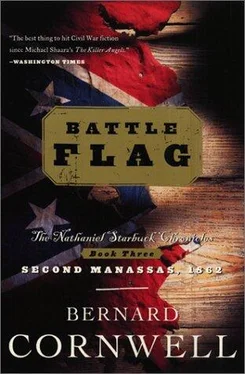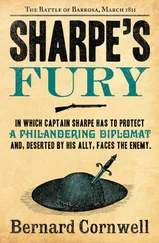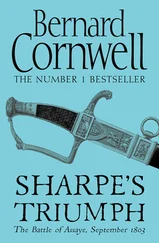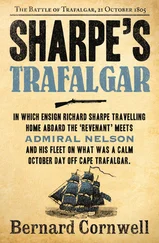Coffman stumbled out of the ford and half ran to the General's side. "Sir?"
The ragged-bearded Jackson frowned down from his saddle. "Do you remember me, Coffman?"
"Yes, sir, of course I do, sir."
Jackson lowered his left hand very gently, as though he feared he might damage the arm if he moved it fast. "I was sorry you had to leave the Institute early, Coffman. It was after your plebe year, was it not?"
"Yes, sir. It was, sir."
"Because your father died?"
"Yes, sir."
"And your mother, Coffman? She's well?"
"Indeed, sir. Yes, sir, thank you, sir."
"Bereavement is a terrible affliction, Coffman," the General observed, then slowly unbent his rigid posture to lean toward the slim, fair-haired Lieutenant, "especially for those who are not in a state of grace. Are you in a state of grace, Coffman?"
Coffman blushed, frowned, then managed to nod. "Yes, sir. I think I am, sir."
Jackson straightened again into his poker-backed stance and, as slowly as he had lowered his left hand, raised it once more into midair. He lifted his eyes from Coffman to stare into the heat-hazed distance. "You will find it a very hard thing to meet your Maker if you are unsure of His grace," the General said in a kindly voice, "so study your scriptures and recite your prayers, boy."
"Yes, sir, I will, sir," Coffman said. He stood awkward and uncertain, waiting for the General to speak further, but Jackson seemed in his trance once again, and so the Lieutenant turned and walked back to Starbuck's side. The Legion marched on, and the Lieutenant remained silent as the road climbed between small pastures and straggling woods and beside modest farms. It was a good two miles before Coffman at last broke his silence. "He's a great man," the Lieutenant said, "isn't he, sir? Isn't he a great man?"
"Tom Fool?" Starbuck teased Coffman.
"A great man, sir," Coffman chided Starbuck.
"If you say so," Starbuck said, though all he knew about Jackson was that Old Mad Jack had a great reputation for marching, and that when Old Mad Jack went marching, men died. And they were marching now, marching north, and going north meant one thing only: Yankees ahead. Which meant there would be a battle soon, and a field of graves after the battle, and this time, if Pecker was right, Starbuck's enemies would not just be in front of him but behind as well. Starbuck marched on. A fool going to battle.
The midday train stopped at Manassas Junction amidst a clash of cars, the hissing of steam, and the clangor of the locomotive's bell. Sergeants' voices rose over the mechanical din, urging troops out of the cars and onto the strip of dirt that lay between the rails and the warehouses. The soldiers jumped down, glad to be free of the cramped cars and excited to be in Virginia. Manassas Junction might not be the fighting front, but it was still a part of a rebel state, and so they peered about themselves as though the landscape was as wondrous and strange as the misty hills of mysterious Japan or far Cathay.
The arriving troops were mostly seventeen– and eighteen-year-old boys come from New Jersey and Wisconsin, from Maine and Illinois, from Rhode Island and Vermont. They were volunteers, newly uniformed and eager to join this latest assault on the Confederacy. They boasted of hanging Jeff Davis from an apple tree, and bragged of how they would march through Richmond and roust the rebels out of their nests like rats from a granary. They were young and indestructible, full of confidence, but also awed by the savagery of this strange destination.
For Manassas Junction was not an inviting place. It had been sacked once by Northern troops, destroyed again by retreating Confederates, then hastily rebuilt by Northern contractors, so that now there were acres of gaunt, raw-timbered warehouses standing between rail sidings and weed-filled meadows that were crammed with guns and limbers and caissons and portable forges and ambulances and wagons. More stores and weapons arrived every hour, for this was the supply depot that would fuel the summer campaign of 1862 that would end the rebellion and so restore a United States of America. The great spread of buildings was shadowed by an ever-present pall of greasy smoke that came from blacksmiths' shops and locomotive repair sheds and the fireboxes of the locomotives that dragged in their goods wagons and passenger cars.
Two cavalry officers waited at the depot. They had clearly gone to some considerable effort to make themselves presentable, for their uniform coats were brushed spotless, their spurred boots were shining, and their leather belts polished. The older man was middle-aged and balding, with a pleasant face and thick muttonchop whiskers. His name was Major Joseph Galloway, and he clutched a plumed hat in his
nervous hands. His companion was a much younger man, handsome and fair-haired, with a square beard and wide shoulders and an open face that inspired trust. His coat showed a captain's bars.
Both men were Virginians, yet both fought for the North. Joseph Galloway owned property just outside Manassas itself, and that farm was now the depot for a regiment of Northern cavalry exclusively recruited from Southerners loyal to the government in Washington. Most of the troopers for Galloway's Horse were volunteers from the border states, the disputed lands of Maryland, and the western counties of Virginia, but a good number were refugees from the Confederate States themselves. Galloway had no doubt that some of his men were fugitives from Southern justice, but the majority were idealists who fought to preserve the Union, and it had been Major Galloway's notion to recruit such men for reconnaissance work deep behind the rebel lines. Northern horsemen were solid and brave, but they rode the Virginian countryside as strangers, and in consequence they were timid compared to the rakehell Southerners who knew that every Virginian village and hamlet contained sympathizers prepared to hide and feed them. It had been Galloway's inspiration to raise a regiment that could ride the rebel states like native Southerners, yet the idea had received only lukewarm support from Washington. Raise the regiment, the government's bureaucrats had told Major Galloway, and we might deign to employ it, but only if it came properly equipped with weapons, horses, and uniforms.
Which was why Major Galloway and Captain Adam Faulconer now waited for a passenger who was supposed to have arrived on the midday train that had just steamed into Manassas. The two cavalry officers worked their way against the flood of excited soldiers toward the train's last car, which had been reserved for passengers more exalted than mere cannon fodder. A porter lowered the carriage steps, and two ladies, their hooped skirts scarce able to squeeze through the car's narrow doorway, were handed down. After the ladies came a group of senior officers, their mustaches trimmed, their uniforms brushed, and their faces flush from the day's heat and from their consumption of the railroad's whiskey. One officer, younger than the rest, broke away and shouted at some orderlies to bring horses. "Chop, chop now! Horses for the General!" the aide shouted. The ladies' twin parasols bobbed white and lacy through the mist of tobacco smoke and the crush of dark military hats.
The last man to alight from the passenger car was a thin, tall, and elderly civilian with white hair and beard, fierce eyes, and a gaunt, stern face. He had sunken cheeks, a Roman nose as imperious as his gaze, a black frock coat, a top hat, and despite the heat, a high-buttoned vest over which a pair of starched Geneva bands hung white. He carried a dark maroon carpetbag and an ebony stick that he used to push aside a black servant who was lifting the ladies' cabin trunks onto a handcart. The gesture was peremptory and unthinking, the act of a man accustomed to authority.
Читать дальше
Конец ознакомительного отрывка
Купить книгу












